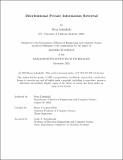Distributional Private Information Retrieval
Author(s)
Lehmkuhl, Ryan
DownloadThesis PDF (804.9Kb)
Advisor
Corrigan-Gibbs, Henry
Terms of use
Metadata
Show full item recordAbstract
A private-information-retrieval (PIR) scheme lets a client fetch a record from a remote database without revealing which record it has fetched. Classic PIR schemes treat all database records the same but, in practice, some database records are much more popular (i.e., commonly fetched) than others. We introduce distributional private information retrieval, a new type of PIR that can run faster than classic PIR—both asymptotically and concretely—when the popularity distribution is heavily skewed. Distributional PIR provides exactly the same cryptographic privacy notion as classic PIR. The speedup comes from providing a relaxed form of correctness: distributional PIR guarantees reliable retrieval for PIR queries that follow the popularity distribution, but only “best-effort” retrieval for out-of-distribution queries. We give several constructions of distributional-PIR schemes that make black-box use of existing standard PIR protocols. On a popularity distribution drawn from real-world Twitter data, distributional PIR reduces compute costs by 5.1–77× compared to existing techniques. Finally, we build CrowdSurf, an end-to-end system for privately streaming social-media posts, and show that our PIR schemes reduce the end-to-end server cost by 8×.
Date issued
2024-09Department
Massachusetts Institute of Technology. Department of Electrical Engineering and Computer SciencePublisher
Massachusetts Institute of Technology